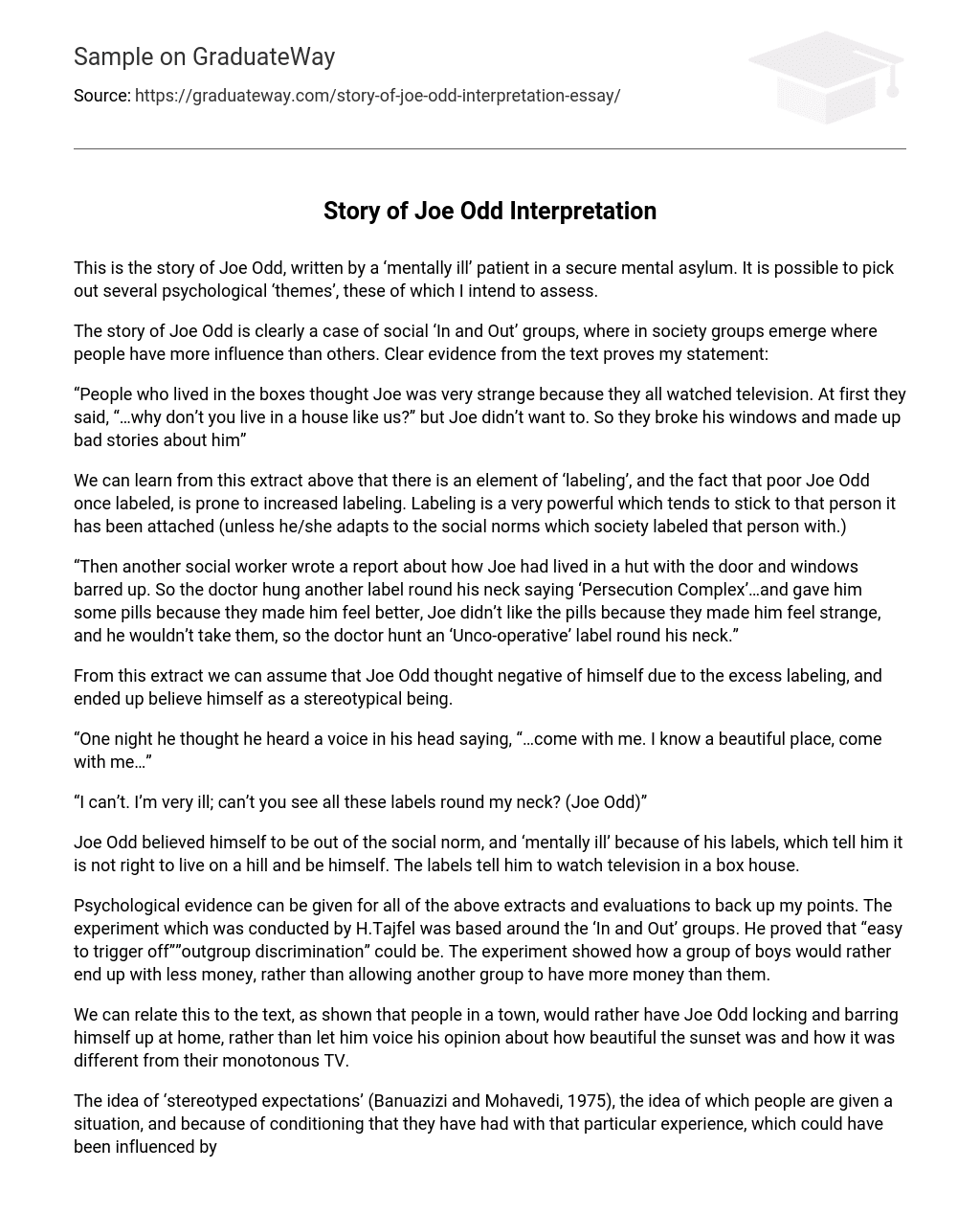This is the story of Joe Odd, written by a patient in a secure mental asylum who is considered ‘mentally ill’. I will analyze the various psychological ‘themes’ present in the story.
Joe Odd’s story exemplifies the existence of societal ‘In and Out’ groups, wherein certain groups hold more influence than others. The text provides compelling evidence to support this assertion:
“People residing in the boxes found Joe to be quite odd since they all indulged in watching television. Initially, they questioned, “…why don’t you reside in a dwelling like ours?” However, Joe had no desire to comply. Consequently, they maliciously shattered his windows and fabricated slanderous tales about him.”
We can observe from this given passage that there exists a concept of ‘labeling’ where poor Joe Odd, once labeled, becomes more likely to be labeled further. Labeling is an influential force that tends to remain attached to the individual, unless they conform to the societal norms by which they have been labeled.
Then, another social worker documented that Joe resided in a hut that had fortified door and windows. Subsequently, the doctor attached another label to Joe’s neck stating ‘Persecution Complex’ and prescribed him pills to alleviate his symptoms. However, Joe was discontent with the pills as they induced a peculiar sensation, causing him to refuse taking them. Consequently, the doctor fastened an ‘Unco-operative’ label to his neck.
Based on this passage, it is evident that Joe Odd had a negative perception of himself as a result of being labeled excessively, ultimately causing him to perceive himself as a stereotypical individual.
“One night he thought he heard a voice in his head saying, ‘…come with me. I know a beautiful place, come with me…'”
“I cannot. I am extremely ill. Can you not see all of these labels around my neck?” (Joe Odd)
Joe Odd perceived himself as deviating from societal norms and viewing himself as “mentally ill” due to the limitations imposed by his labels. The labels dictate that it is unacceptable for him to reside on a hill and embrace his true self. Instead, they restrict him to the confinement of a box house where his only form of engagement is through television.
Psychological evidence can support all of the aforementioned extracts and evaluations, substantiating my points. An experiment conducted by H.Tajfel revolved around the concept of ‘In and Out’ groups. The experiment demonstrated the ease with which outgroup discrimination could be initiated. The findings revealed that a group of boys would willingly sacrifice their own monetary gain to prevent another group from receiving more money than them.
We can apply this in the context of the text, as it illustrates that the townspeople preferred Joe Odd to isolate himself at home instead of allowing him to express his view on the exquisite sunset and how it differed from their mundane television programming.
The concept of ‘stereotyped expectations’ (Banuazizi and Mohavedi, 1975) suggests that individuals tend to conform to certain roles based on their previous conditioning in specific situations, influenced by factors such as media or social learning.
This paragraph presents evidence of Joe Odd finally acknowledging his illness due to the overwhelming labels imposed on him by society. Eventually, he decides to discard these labels and reverts back to being his “normal” self in a familiar setting.
Szasz (1972) argued against the medical model and its criticisms, stating that individuals cannot be considered mentally ill. He proposed that the human brain experiences a decease rather than a disease of the mind. When considering Joe Odd’s situation, it can be assumed that he was misdiagnosed by “normal” people, resulting in an incorrect label being assigned to him. These individuals, unable to admit their mistake, instead added more labels to Joe Odd in an attempt to match his character.
In considering the concept of ‘in and out groups’, my assessment is that Joe Odd experienced real-life prejudice. Joe Odd lived what he considered a ‘normal’ life, engaging in everyday activities and peacefully going about his own existence. However, upon encountering different people and, more significantly, a society where the majority upheld a distinct perspective on life and engaged in different activities, Joe Odd was not permitted to influence the society with his unconventional disposition. Consequently, swift measures were taken to remove him. I firmly believe individuals should have the freedom to express their opinions and emotions and live in a manner they deem appropriate, as long as they abide by their country’s laws (with boundaries always existing). People should not have to hide away in fear due to their uniqueness (and face persecution). This situation arises from an ignorant society.
The society itself is composed of individuals, and in the story of Joe Odd, all these individuals held identical opinions and engaged in the same activities. For the society to progress, it is essential for these monotonous individuals to comprehend the reasons behind Joe Odd’s behavior. Media and education play a significant role in shaping human perspectives towards one another, and they are crucial in eliminating prejudice and enabling those who lack understanding to gain it. It is crucial for people to be exposed to novel opportunities and alternative paths that lead to the exploration of new places and ideas, as opposed to continuously sitting inside a box and watching television all day.
To conclude, the concept of ‘labeling’ can be a harsh way of exerting power. As mentioned earlier, individuals need to be educated and exposed to new perspectives in order to comprehend those who are considered ‘different’. An ignorant person tends to only prioritize their own well-being, consequently resorting to multiple labels to categorize individuals who may not fit into their norm. However, the more society and individuals gain understanding and education, the less they will rely on labels to define ‘different’ people, as they will have insight into the reasons behind their uniqueness.





